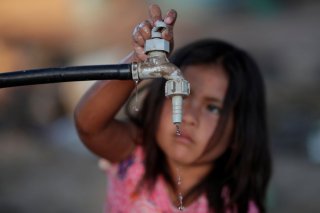How the Coronavirus Is Making the World Much, Much Poorer
Let's hope the coronavirus is defeated soon.
A little-noted side effect of the COVID-19 crisis on employment is the impact on the more than 100 countries where the inflow of remittances from workers overseas account for at least 1 percent of GDP. According to the U.N. International Labor Organization, full or partial lockdown measures to contain the COVID-19 pandemic are affecting almost 2.7 billion workers worldwide, or about 81 percent of the global labor force. Nearly half of those affected are in labor-intensive and low-skilled jobs, many of which are traditionally filled by migrants who often send money home and have no source of replacement income to do so if they lose their jobs.
In 2019, migrants around the world sent at least $700 billion in recorded remittances back to their home countries. Additionally, the International Monetary Fund believes that so-called unrecorded remittances through informal channels (such as money changers) may be 50 percent larger than recorded flows, which would put total remittances from migrants as exceeding $1.7 trillion, or nearly 2 percent of global GDP (gross world product), last year.
These remittances are a particularly crucial source of revenue for Haiti (accounting for 34.3 percent of GDP), as well as Central American countries such as Honduras and El Salvador. The InterAmerican Dialogue projects remittances in Latin America and the Caribbean alone will be 7-12 percent lower than in 2019, even if COVID-19 is contained by June. In Mexico, President Andres Lopez Manual Obrador has called on the country’s citizens working in the United States to "not stop thinking about their loved ones" back at home. His government has also announced among the smallest COVID-19 relief packages to financially support its own citizens amid the crisis, underlining Mexico’s reliance on those cash inflows from migrants abroad.
The Outlook
The current employment crisis due to COVID-19 lockdown measures will have dramatic income effects on these countries as it disproportionately affects labor-intensive and low-skilled jobs that are often filled by migrants, including those in retail trades, manufacturing, and accommodation and food services. Indeed, the InterAmerican Dialogue projects remittances in Latin America and the Caribbean alone will be 7-12 percent lower than in 2019, even if COVID-19 is contained by June. The effects on agriculture, which tends to be the largest sector in many developing countries, are yet not evident without data on how COVID-19 affects rural communities. But even if rural areas experience less infection, agricultural sectors in many countries are already anticipating labor supply issues due to the increasing amount of border closures and movement restrictions now being implemented.
Unemployment is typically a lagging indicator of economic conditions, as layoffs follow developing economic contractions. The speed and severity of current shutdowns, however, have a real-time impact on labor markets and employment that cannot be easily mitigated. The net effect of high unemployment and reduced remittances in the current global crisis will be that countries with fragile economies or weak governance will face an added burden of adjusting to the current crisis as do those experiencing conflict or facing potential natural disasters. This could, in turn, multiply sources of potential social unrest and political stability in many countries where those are already festering problems.
Background
Small open economies with a comparative labor advantage but limited domestic production activities often “export” workers who send home remittances in the form of cash transfers. More than three-fourths of that goes to low and middle-income countries and has a significant effect on alleviating global poverty levels.
Unlike capital flows, particularly portfolio flows, remittances tend to be stable and aren't usually affected by economic crises. Migrants who lose jobs usually try to absorb income losses by cutting consumption and moving to jobs in other sectors. Reverse migration is seldom a side effect, driven by fear of being unable to re-enter the country of residence. Remittances offer a backup plan in nations lacking widespread official social safety nets that would disappear in the event of the return of migrants back home.
At the same time, remittances are not unambiguously beneficial for recipient economies, as they deprive countries of labor that could be used domestically, further limiting the economic development potential of these countries. And while remittances can support consumption, they can also deter the development of local businesses outside the banking sector due to currency appreciation.
COVID-19 Will Cause Global Poverty to Spike is republished with the permission of Stratfor Worldview, a geopolitical intelligence and advisory firm.
Image: Reuters.


